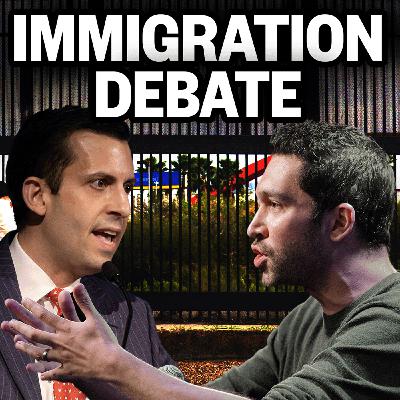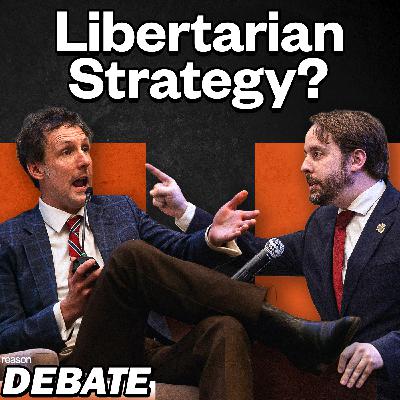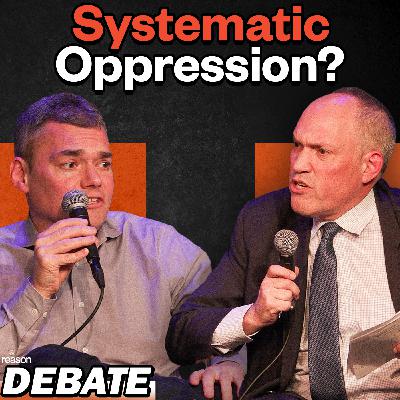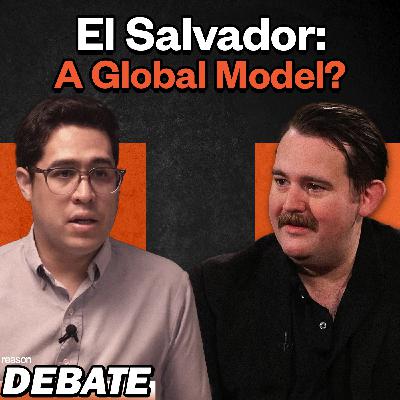Glenn Greenwald and Alan Dershowitz Debate Bombing Iran
Description
Professor and legal scholar Alan Dershowitz and Pulitzer Prize–winning journalist Glenn Greenwald debate the resolution, "The U.S. should strike Iran's nuclear facilities."
Taking the affirmative is Dershowitz, an American lawyer and law professor known for his work in U.S. constitutional law and American criminal law. From 1964 to 2013, he taught at Harvard Law School, where he was appointed as the Felix Frankfurter Professor of Law in 1993. He is the author of several books about politics and the law, including The Case for Israel and The Case for Peace. His two most recent works are The Case Against Impeaching Trump, and Guilt by Accusation: The Challenge of Proving Innocence in the Age of #MeToo. In January 2020, he joined President Donald Trump's legal team as Trump was being tried on impeachment charges in the Senate. He is a strong supporter of Israel but self-identifies as both "pro-Palestinian and pro-Israeli."
Taking the negative is Greenwald, a constitutional lawyer, investigative journalist, and best-selling author. Acclaimed as one of the 25 most influential political commentators by The Atlantic, one of America's top 10 opinion writers by Newsweek, and one of the Top 100 Global Thinkers for 2013 by Foreign Policy, Greenwald has won the highest awards in journalism, including the 2014 Pulitzer Prize for Public Service for the revelations surrounding the National Security Agency and Edward Snowden.
This debate was moderated by Soho Forum Director Gene Epstein.
Timestamps:
00:00:00 Introduction
00:02:06 Dershowitz's Opening Statement
00:19:43 Greenwald's Opening Statement
00:37:48 Dershowitz's Rebuttal
00:45:27 Greenwald's Rebuttal
00:53:56 Q&A
01:35:08 Dershowitz's Summation
01:40:22 Greenwald's Summation
Abbreviated Transcript:
Moderator: Now that we've got everyone voting, we can call our debaters to the stage. The United States should strike Iran's nuclear facilities speaking for the affirmative Alan Dershowitz. Alan, please come to the stage. Speaking for the negative, Glenn Greenwald. Glenn, please come to the stage.
All right guys, as you know, the timekeeper is in front. We'll be flashing five minute, two minute, and one-minute and 30 seconds cards. Professor Dershowitz prefers to use the 85-year-old prerogative and do it from his chair. Alan, you have 17 and a half minutes to make your case. Please take it away, Alan.
Alan Dershowitz: Thank you so much. What a wonderful event. At a time when, as the moderator said, there are too few debates, too many bumper stickers, too many people cheering for one side or the other, having a great debate about a really difficult subject is so important. Parts of me wishes this was not a debate, wishes it was a discussion because there are arguments on both sides of this. Very, very compelling arguments on both sides of this. It's a very, very difficult question anytime a decision is made to take preventive military action that involves cataclysmic consequences and considerations.
I want to go over why I think the argument here favors taking such preventive military action, though I understand the consequences. We know, we know the risks of taking preventive military action when it shouldn't have been taken. We can call those false positives. You can call them by whatever word you want to call them, but we know that that happened in Iraq when we went in thinking or believing or proclaiming or claiming that there were nuclear facilities only to find out that there wasn't with very tragic events for so many people, civilians and military.
A lot has been written about false positives. A lot has been written about false decisions, poor decisions, to take military intervention in a preventive way, but not enough has been written about or considered about the risks of not taking preventive action when preventive action is necessary and would save lives and would do a great deal of good in the world. History provides lots of examples of failures to act when action might have prevented catastrophic harms. And I'm going to argue that this is one such situation. Perhaps the most telling example of the failure to act was the failure of Great Britain and France to enforce the Versailles Treaty by taking preventive military action to stop the military buildup of Germany following the first World War. A military attack on Germany in 1935 or '36 when its war machine was still weak, might have prevented the second World War with its tens of millions of deaths.
Joseph Goebbels, who was the obviously propaganda minister of the Nazi regime, wrote about this in his diaries. I hope you'll pay very close attention to this one paragraph because it's so critical. Here's what he said: "In 1933, a French premier ought to have said, and if I had been the French premier, I would've said," this is Goebbels talking. "The new Reich Chancellor is the man who wrote Mein Kampf, which says this and that. The man cannot be tolerated in our vicinity. Either he disappears or we march. But they didn't do it. They let us slip through the risky zone and we were able to sail around the dangerous reefs. And when we were done and well armed better than they." He then says they started the war. Of course, Germany started the war, but the point is still the same.
The rest we know is tragic history. Germany built up its armed forces without countermeasures by its intended enemies and conquered most of Western Europe, killing tens of millions of people. Most of these deaths could almost certainly have been prevented had Great Britain and France engaged in preventive military action before Germany became well armed. But at that moment in history when Great Britain and France could have prevented the horrendous harm known ultimately caused by Nazi Germany, there was no way of knowing in advance predicting the extent of what [Adolf] Hitler will do. History is blind to the future. History only knows the past. Yes, he wrote Mein Kampf, but many conquerors, would-be conquerors, do not follow through on their threats. Recall [Nikita] Khrushchev's threat to bury the United States, yet he backed away from a nuclear confrontation over Cuba.
There was no way of predicting with any degree of certainty that Hitler would personally turn his belligerent rhetoric into military invasions of Poland, the Soviet Union, and then obviously the Holocaust. As always, it was a question of cost-benefit probabilities. This was a classic case of a false negative, implicitly predicting that Hitler would not do what he in fact did and failing to take actions in order to prevent it. If France and Great Britain had accurately predicted the actual harms, they would almost certainly have taken preventive action even if the costs were high because it would never have been nearly as high as it turned out to be in the absence of such action. But as I say, history is blind. Had Great Britain and France decided to take preventive military actions in the mid-1930s and done so successfully, no one would ever know what was prevented.
And [Winston] Churchill, if he had been the prime minister in the middle '30s, and he would've predicted that Hitler would kill tens of millions of people unless he was stopped, he would've been attacked by the international community, by the world. He would've been disbelieved, even mocked as [British Prime Minister] Clement Attlee was mocked for taking military action against Egypt in 1956.
Had Great Britain and France engaged in preventive military action that resulted in say, the deaths of 10,000 Germans and 5,000 British and French soldiers and civilians, the leaders who undertook such a military adventure would've been condemned as war criminals because no one would ever know how many deaths they prevented by the sacrifice of those 15,000 lives. Ignorance of the hypothetical future is often the reason for failure to act in the present. Had Great Britain and France acted, everyo




















